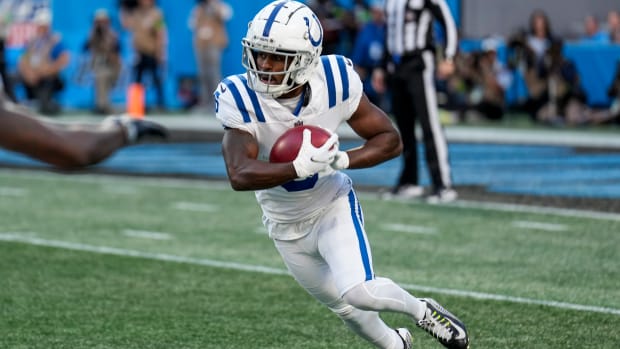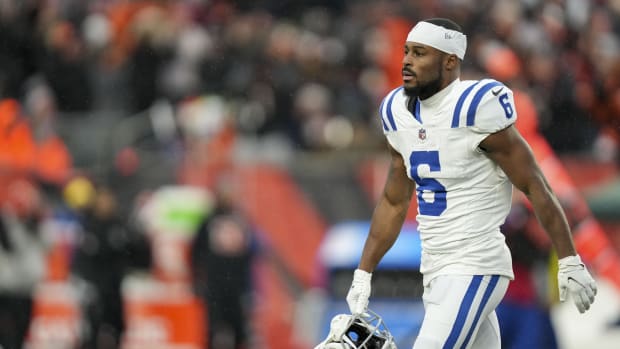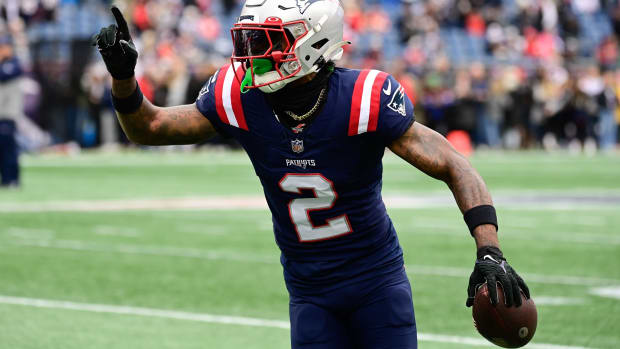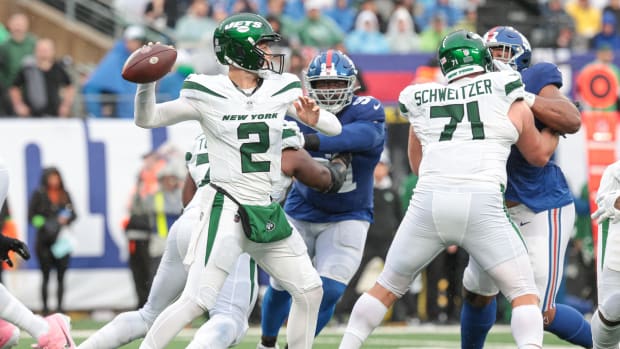New York Giants Notebook | Takeaways from the Giants Position Coaches
The New York Giants position coaches met with the media on Tuesday and laid out their current objectives with their respective players heading into Week 6.
Injuries are slowly starting to eat away at the roster, which has left certain position coaches with a trickier job than usual.
Here's how they're approaching those challenges.
Running Backs Coach Burton Burns
The Giants running game took a slight step back in Week 5 from its 100-yard rushing performance in Week 4, averaging 89 yards on the ground against the Cowboys, a disappointing total given the struggles of the Cowboys run defense that gave up 307 yards on the ground to the Browns the week before.
The good news for the Giants is that running back Devonta Freeman has emerged as the team's featured back. Freeman saw 17 of the team's 27 total carries last Sunday, racking up 60 yards and his first Giants touchdown to lead the team in rushing yardage.
Freeman's improvement from each week is evident and paying off with production, and it's due to his continued commitment to learning the offense since joining the team back in Week 3.
Freeman is even starting to resemble the type of running back he was with the Atlanta Falcons, according to running backs coach Burton Burns.
"He's getting better every day as far as functioning in the offense and understanding what he has to do," Burns said.
"This guy does a good job of getting his shoulders and his body north, and he runs physical, so those are the things that he was known for in Atlanta.
"That's the one thing we've been impressed with is running downhill and he has this attitude of running through tackles so that's been good to see."
Tight Ends Coach Freddie Kitchens
Tight end Evan Engram was involved in some unconventional roles last Sunday, as he scored his first touchdown of the season via a run on an end-around at the goal line.
"Evan is very versatile in the things that he can do," said tight ends coach Freddie Kitchens.
"We try to find ways each week to get Evan the ball and we were successful at that this past week and Evan did a good job of making the most of his opportunities."
The Giants still haven't been able to do much with Engram in the passing game yet, however, as he only hauled in one reception for 16 yards against Dallas, bringing his season total to 17 catches for 131 yards.
The Giants offense hasn't managed to effectively utilize Engram as the deep vertical threat he can be. While it's partly due to the Giants' inconsistent protection limiting the amount of time Engram has to get vertical and quarterback Daniel Jones faces to get set, Kitchens claims that it is also due to the type of attention Evans draws from defenses.
"We've got plays from week-to-week where Evan is getting vertical within the defense and sometimes, they cover it," Kitchens said.
"People are aware of what type of athlete and what type of football player Evan is so we just need to continue to do our best to get the ball into Evan's hands and he needs to continue to work which he has been."
Wide Receivers Coach Tyke Tolbert
A Giants touchdown pass to wide receiver Darius Slayton was nullified last Sunday due to a questionable penalty called on wide receiver Damion Ratley for illegal contact.
According to wide receivers coach Tyke Tolbert, Ratley wasn't meant to run a pick play there and was supposed to run a route, but got tangled in the arms of his defender and drew a costly penalty.
"The problem was Damion was actually running a route," Tolbert said. "He was supposed to let Slayton clear and run a route. He comes underneath and he comes back out, and the problem was as he was running his route, he went inside and the guy who was covering Slayton ran into [Ratley]."
"Coach Judge says all the time, it's not what it is, it's what it looks like, and it looks like he's trying to pick the guy when he's actually not. He takes two steps up the field, goes underneath Slayton and the problem was it was a little fast, he went over top of Slayton and ended up picking his guy. So it was unfortunate but there was no intended pick on the play."
The slight mistake by Ratley likely was the final straw for the Giants, who cut him Tuesday.
The Giants are going to hope to avoid mistakes like that going forward. Tolbert is tasked with working with the wide receivers to ensure that those mistakes are avoided, and already knows what the key teaching point needs to be.
"More patience," Tolbert said of what there was to be learned. "Let Slayton clear and have more patience to let him clear first and go underneath and then come back out so that's a teaching thing."
Inside linebackers coach Kevin Sherrer
Veteran linebacker David Mayo returned to practice for the Giants last week since having knee surgery toward the end of training camp.
Inside linebackers coach Kevin Sherrer said that Mayo has looked good as he works his way back to the field, but isn't fully back into the routine of attending meetings.
"Depending on whether during game preparation he's allowed to be in some but then obviously when we go to the hotel and travel, he's not around. But he's been around the building since he's come back."
Sherrer is hoping to get Mayo back in regular meetings and practice soon but won't know until head coach Joe Judge gives the green light for his full return.
In the meantime, seventh-round rookie linebacker Tae Crowder, this year's "Mr. Irrelevant," has found a role in the base defense.
Sherrer has a history with Crowder from their shared time at Georgia and has been impressed by the former Bulldog's adaptation to the NFL game.
"With most rookies obviously it takes a little bit of time and you kind of saw that early on once we got out of training camp and into game time," Sherrer said.
"He had a little hamstring issue that slowed him down a little bit and we kind of progressed, kind of pushed him into some packages to get him going and since then he's really done a very good job."
Sherrer said that Crowder has been coming out of his shell of late.
"Off the field, he's very quiet. Once you get him on the field he's going to talk and communicate. You can see Blake [Martinez] is directing the traffic but [Crowder] is kind of like the co-pilot."
Crowder has made surprising contributions for the Giants' defense so far, especially considering that he is newer to his position than most. Crowder began his college career as a running back and has thus far made the successful conversion to the other side of the ball.
Crowder's showcased the ability to learn quickly throughout his career, which bodes well for his future with the Giants and the role he is capable of filling.
Defensive Backs Coach Jerome Henderson
Cornerback Ryan Lewis made his first start for the Giants last Sunday against the Cowboys and put up a performance that was ultimately defined by giving up a critical catch to Cowboys wide receiver Michael Gallup on the Cowboys' game-winning drive.
Defensive backs coach Jerome Henderson was impressed by the physicality that Lewis played with, but admitted that there were still several plays that they would have liked to have back and that there are still things Lewis has to clean up.
"I thought as a rolled-up corner he was physical, he banged people, he played with good awareness," Henderson said.
"I know for him that last play is one he'd like to have back, that I know I'd like for him to have back as well and all the Giant fans all over the world would, but we don't get that.
"As I watch that play, I get a chance to rewind it and see it in slow motion, I'd like him to stay on his feet and in the position, he was maybe playing it out of his hands instead of looking back.
"Hopefully we learned from that lesson and next time that play comes up I think Ryan is going to make that play for us."
Through five weeks of play, Giants quarterback Daniel Jones boasts the third-best average time to pass attempt among quarterbacks who have taken at least 80% of their team’s snaps.
Jones’s 2.77-second average falls just behind Seattle’s Russell Wilson (2.81 seconds) and Kansas City’s Patrick Mahomes (2.79 seconds). Yet among that same sample group, Jones has a 61% completion percentage, 12th out of the 13 eligible quarterbacks, while being dead last in touchdown passes thrown and tied for third (with Deshaun Watson of the Texans and Ryan Fitzpatrick of Miami) for most interceptions tossed.
Why is that? One reason could be his on-going struggle to establish a clock in his head regarding how much time he has to throw the ball, an issue that plagued him last season as a rookie.
“Yeah, a pocket presence is an important thing; there's no doubt about it,” said Giants quarterbacks coach Jerry Schuplinski. “Understanding what we're trying to accomplish on each play is another part that goes into that. So some of the plays are designed to get the ball out really quick, and some of the deeper ones down the field, and even some of the third downs it's big.”
Overall, the Giants have allowed 97 pressures through five games. According to PFF’s that’s the highest number of pressures allows in the league, just edging out the Bengals (95) for the league lead. Those pressures have certainly been a factor, but there have been other reasons for Jones’ sluggish start, the biggest one being how quickly he processes what he's seeing.
As was the case during his rookie season, Jones has a general understanding of what to do with the ball on every play. But where he often gets into trouble is when he has to deviate. This has led to him sometimes trying to fit balls into tight windows, leading to unfavorable results.
Along those lines, Jones is also trying to get better at going through his progressions. According to PFF, Jones graded out with a 72.2 when making throws on a first read, but then that number dropped to 48.5 when he attempted to thrown on second or third reads.
Another problem that has started to creep into Jones’ game is that he has been drifting backward in the pocket rather than stepping up.
Part of that is likely due to the pressure that’s coming his way. By retreating in the pocket instead of using his legs to slide around, Jones is hurting his chances of getting a ball to a receiver down the field and usually ends up settling for something underneath--if he connects at all.
“The biggest thing we're just trying to emphasize is, ‘Let's move in the pocket, get our feet set and get a good throw off,’” Schuplinski said. “It doesn't always work out, but that's what, that's what the goal is.”
Overall, Schuplinski likes the progress Jones has made from the start of camp and thinks there is a lot more to like about Jones’s game than to dislike.
“He has made progress in areas in a lot of ways,” Schuplinski said. “His balls are coming out pretty fast. He's good at his communication up at the line of scrimmage and trying to get things organized. He's done a good job of mixing up some snap counts and cadences.
“I think the accuracy has been pretty good and he's, he's done better with decision making. I think that progress has been good to see from him.”




